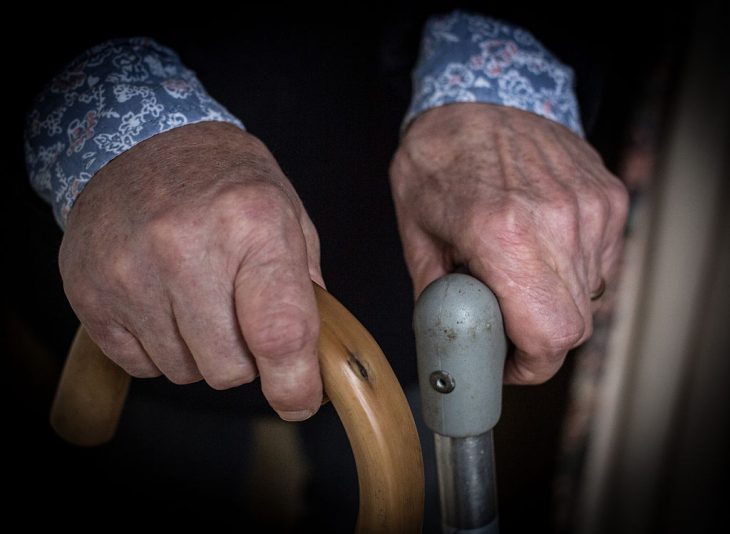Social care is in crisis. Everyone knows that – or at least likes to say so to sound well-informed. It is Westminster’s latest trendy crisis – rich with case studies of elderly people trapped in hospital for weeks, or trapped in their beds at home with one flying fifteen minute visit a day in which a carer has to choose whether to bathe that elderly person or take them to the toilet. It is now a comfort blanket topic for Jeremy Corbyn to retreat to at Prime Minister’s Questions whenever he has run out of other things to ask Theresa May about. But is anyone doing anything about this crisis, other than talking about it?
There’s a lot of talking big and very little action. Every few years, another politician launches another inquiry into social care which then languishes for years after publication, forgotten and uncared for. Theresa May has agreed to cross-party talks on social care – a phrase those working in the sector have become inured to as something that involves a lot of kicking and rather too much long grass. This week, Philip Hammond is set to unveil a review of the long-term funding arrangements for social care, and a £1.3 billion funding boost to plug the immediate black hole.
These measures are in response to pressure from across the political spectrum, including in Hammond’s own party. The cross-party Communities and Local Government Select Committee had called for a £1.5 billion spending pledge for this year, taken out of the government’s Better Care Fund (Hammond’s pre-briefed pledge appears to be over two years, so it doesn’t come close). Surrey County Council, which found itself a useful prop for Corbyn at one of those Prime Minister’s Question Time sessions, had threatened to hold a referendum on a whopping 15 per cent hike in council tax to fill its own black hole. Unsurprisingly, the Council Leader David Hodge wasn’t all that keen on asking his local voters to back a big tax rise, and was found to be pushing ministers hard for help in avoiding the vote, which he then called off, claiming central government was showing signs of taking the funding shortfall seriously.
If central government is taking what the King’s Fund claims is a £1.9 billion funding gap seriously, then that is progress. To this point, politicians haven’t given the impression that they really do take social care seriously: otherwise, they wouldn’t have consistently dropped plans to fund it properly. The past decade is paved with well-intentioned attempts to reform the system so that the people in it get adequate care and local authorities can provide it for them. None have succeeded.
Perhaps one of the problems is that social care isn’t yet taken sufficiently seriously by the public for politicians to worry about it. It is rarely named in polls of the most important issues. This might be because voters don’t fully understand how it is distinct from the health service – and because no-one wants to think too much about what will happen at the end of their lives, they don’t want to look into what social care actually entails until they find themselves caught up in it.
The system isn’t any less confusing once you look into it. Social care is support to help someone live an independent life at home, ranging from visits by a carer to residential care homes and day centres. Unlike NHS treatment, it isn’t free-at-the-point-of-access but means-tested. And there is so much demand for support, particularly of the variety that involves someone coming round to help an elderly person wash and clean their home, that often the only option is for someone to arrange for their help privately – or rely on any relatives who can help.
In fact, the pressure is so great that in the five years to 2014, the number of over-65s receiving local authority-funded social care fell by 26 per cent. That’s not because demand is falling: unlike other areas of public services such as the Home Office where crime figures are dropping, we have an ageing population and an increasing number of people living with chronic conditions such as heart disease, diabetes and dementia. But England is one of the few major developed countries that has not reformed the way it approaches long-term care. Instead, it has commissions, policy proposals, and then no action.
In October 2016, the Care Quality Commission warned that the ‘sustainability of the adult social care market is approaching a tipping point’. And last month the National Audit Office warned that the government’s £5.3 billion Better Care Fund, which is supposed to keep people out of hospital, was not resulting in fewer emergency admissions, or fewer people stuck in hospital because they have no suitable care package to go to; in fact, both had risen.
Social care is a classic example of the failure of politicians to deal with long-term problems. They have proposed commissions to make themselves look serious about the problem. They have then failed to implement those commissions. This is because they ultimately haven’t seen it as being an urgent problem that they must deal with now. In fact, whoever does end up having to deal with social care and propose a long-term funding settlement will have a miserable time of it because it will involve a lot of money.
Andy Burnham is often teased in Westminster for his U-turns. But when he was in government, he was the victim of a U-turn from his political opponents that stymied his own attempts to fund the system properly. In 2009, the then Health Secretary launched a Green Paper which proposed a National Care Service, funded by a compulsory levy on a person’s assets once they passed away. The Tories had initially promised their support for a better-funded social care system. But then, with an election looming, they turned on Labour, calling the funding plan a ‘death tax’. That marked the death of one plan to reform social care.
The Tories were suspicious of Labour’s motives back in 2009 – and it was silly of the party to tarry so long with its plans for reforms so that it was unveiling them so close to an election. Norman Lamb, the Liberal Democrat former health minister who has since campaigned for a cross-party consensus on the situation in the care system, says:
‘All the solutions are difficult. They all involve more money and they all involve difficult choices about closing hospitals and so on. You end up with a conspiracy of silence. In the 2015 election, none of the political parties had a solution to the NHS and social care crisis, and the cap on care costs that we introduced was abandoned within weeks of the election.’
Lamb isn’t the only person frustrated by the lack of ambition. Cabinet ministers have also been worried about the way their colleagues are avoiding a long-term solution. One describes all the ideas so far as ‘tinkering around the edges’, and complains that no-one wants to be brave and propose what is actually needed. Reports last week of a resurrection of that ‘death tax’ were shot down by Economic Secretary Jane Ellison at Treasury Questions – though Downing Street refused to deny that this policy was under consideration.
A death tax – or any other solution that involves facing up to the long-term shortfall in funding – will be politically unpalatable. Integrating health and social care is another proposal of Burnham’s that most are sympathetic to, given the impact on acute health services of the current miserable situation in social care. But Labour’s Jon Ashworth, who has been campaigning for the party on the issue, points out that ‘proper integration is going to be expensive. There is an ideological point: if you move social care into the NHS, then does it abide by the principles of the NHS in terms of free-at-the-point-of-use? The full financial implications need to be fully understood.’
Downing Street figures had been pretty comfortable with Surrey’s planned referendum because they felt either result would be a boost for the government. Had voters backed a tax rise, ministers could have argued that local democracy was working well and there was no need for more action from Whitehall. If Surrey residents had voted against the increase, then ministers could say that there was no public appetite for more spending on social care.
But even though Theresa May has a slim majority in Parliament and not much money to play with, she does have a political opportunity. The Labour Party is so busy opposing itself that it has very little time to present any serious obstacles to radical reform – and given Corbyn has made social care one of his go-to topics for Prime Minister’s Questions, he would seem churlish to start rejecting genuine proposals.
As I wrote in the magazine recently, governments in difficult circumstances have achieved a great deal in the past. The post-war Attlee government managed sweeping social reforms even though it had many excuses not to bother at all. The real crisis for social care is a crisis of confidence from politicians: they know something big needs to be done, but are just hoping that the inconvenience of doing it will fall on someone else.







Comments